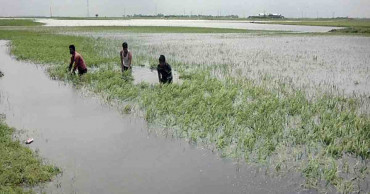Boro paddy
Boro paddy harvest satisfactory: Agriculture Adviser
Agriculture and Home Affairs Adviser Lt Gen (retd) Md Jahangir Alam Chowdhury on Saturday said that this season's Boro paddy harvest in the country has been satisfactory and harvesting will be completed within the scheduled timeframe.
“Arial Beel is an area rich in natural diversity. Everyone must remain vigilant to protect its biodiversity and environment. Necessary measures have been taken to ensure water drainage and facilitate crop transportation in Arial Beel and the surrounding areas,” he said while visiting Arial Beel in Srinagar upazila of Munshiganj district to inspect the Boro harvest and exchange views with farmers.
During the interaction, farmers requested the withdrawal of cases filed against those who had protested the construction of an airport in Arial Beel.
In response, the adviser assured them that necessary steps would be taken to withdraw the cases.
Farmers also urged for the establishment of patrol posts to prevent illegal soil trading, to which the adviser directed the concerned authorities to set up patrol posts urgently.
Adviser Asif Nazrul trashes report by Indian portal as false, defamatory
Speaking at the event, Industries Adviser Adilur Rahman Khan said that locals must cooperate to preserve the environment of Arial Beel.
Adilur also noted that several development projects have been undertaken for Munshiganj, and emphasised that the projects must be implemented properly to ensure food security and achieve self-sufficiency in food production.
Agriculture Secretary Md Emdad Ullah Mian and senior officials of the district administration were also present.
10 months ago
Govt to procure 17.5 lakh tonnes of Boro paddy at Tk 36, rice Tk 49
This year, the government will procure 17.5 lakh tonnes of Boro paddy and rice at Tk 36 and Tk 49, respectively, marking an increase of Tk 4 from the previous year.
Of the total procurement, the government will procure 3.5 lakh tonnes of paddy and 14 lakh tonnes of rice, which will begin from April 24 and continue till August 31.
The decision was taken at a meeting of the Food Planning and Monitoring Committee at the Secretariat on Wednesday with Finance Adviser Dr. Salehuddin Ahmed in the chair.
The committee decided to procure wheat at Tk 36, said Food Adviser Ali Imam Majumdar.
The price of paddy and rice has been fixed by adding profit to the production cost given by the Ministry of Agriculture, he said.
Harvesting of paddy has started in the haor areas and it will start in full swing from Pahela Baishakh. The agriculture adviser will go there to inaugurate the procurement process on April 24, he added.
Bumper Boro paddy yield in Khulna’s saline land brings joy to farmers
Last year, the government set a target to procure 5 lakh tonnes of Boro paddy, 11 lakh tonnes of boiled rice and one lakh tonnes of Atap rice at Tk 32, Tk 45 and Tk 44, respectively.
Despite the continuous floods and heavy rains, the government has maintained a stable situation by importing fertiliser and rice and the target of paddy and rice procurement has been fulfilled, said the Finance adviser.
10 months ago
Slow progress in Sunamganj crop protection dam work worries farmers
Crop protection dam work in Dharmapasha upazila of Sunamganj is progressing at a snail’s pace, leaving farmers worried over the protection of Boro paddy.
Although one month has elapsed since the start of the work the members of the Project Implementation Committees (PICs) for 86 dams in seven haors ihave not received the first installment of funds yet.
According to Dharmapasha upazila administration, seven haors—Chandra Sonar Thal, Joydhana, Sonamorol, Kailani, Joydhana (2), Gurma, and Rui Beel—fall under the jurisdiction of the Sunamganj Water Development Board.
The authorities allocated an amount of Tk 19.15 crore for the 86 crop protection dam projects in these haors.
The members of the PICs for these 86 projects are still waiting for the first installment of funds.
According to the policy, the construction and repairs of the dams were supposed to begin on December 15 last with the work scheduled to be completed by February 28.
The work was inaugurated on December 15 but due to delayed water drainage from the haors, work began in the first week of January.
The funds for the dam work are supposed to be distributed in four installments through cheques.
As per the guidelines, 25% of the allocation is meant to be given as an advance before the work begins. Despite the passage of over a month, the PICs have not received any funds yet.
Several farmers from the haor areas expressed concern saying that due to delays in forming the PICs and other preparatory work the dam construction started late, and the work is progressing slowly, putting their Boro crops at risk.
On a field visit on Monday last, the correspondent found that work of at least ten crop protection dams in Chandra Sonar Thal and Rui Beel haors was moving at a slow pace.
Read: Ballooning number of crop protection dams in Sunamganj haor region raises concern
Soil was piled up in some areas, and only five to seven workers were present at each site.
Salah Uddin, president of the project implementation committee for the 33rd dam in Chandra Sonar Thal, said that their dam, with a length of 990 meters, has been allocated over Tk 23.33 lakh.
"We began the work on time, but we were supposed to receive 25% of the allocated amount before starting the work, however we haven't received a single taka yet. We are facing significant challenges and delays in completing the work. I've heard that the delay is due to the absence of the UNO, but we urgently need the first installment to continue the work," he added.
Jahangir Alam, an assistant engineer in charge of overseeing the dam work, said the first installment of the funds has already been deposited in the bank.
However, the delay in disbursing funds has been hampering the progress of the work, he said.
Acting UNO and Assistant Commissioner (Land) Aliduzzaman said that the previous UNO was transferred on December 31, and a new UNO has been appointed.. “We hope the issue will be resolved in a few days," he said.
Mamun Howlader, executive engineer of the Water Development Board in the district, said that he spoke to the Deputy Commissioner (DC) about the matter.
Read more: Parts of Chandpur town protection dam collapse
DC Mohammad Ilias Mia assured that the PICs would receive their first installment of funds within two to three days, he said.
Crop protection dams are built to protect crops from early floods and landslides.
Haors are wetland ecosystems found in the north-eastern part of Bangladesh. Sunamganj district is famous for its numerous haors.
1 year ago
Govt wants to stand by farmers: Food Minister
Terming farmers as the heart of the country, Bangladesh's Food Minister Sadhan Chandra Majumdar on Tuesday (May 30, 2023) said that the aim of the government is to stand by the farmers.
"Whether they cultivate mango or paddy, the interest of the farmers must be protected,” the minister said at the inauguration ceremony of mango harvesting and marketing in 2023 season in Sapahar's Godown Para area on Tuesday.
The Food Minister said under the leadership of the Prime Minister, there has been a bumper yield of Boro, Aman paddy and mangoes as well and farmers are getting a fair price for paddy. "I hope they will also get a fair price for mangoes,” he added.
Sadhan Chandra said now the supply of local fruits is quite good. “Dollars will be saved if fruits are not imported from abroad and the nutritional value of local fruits is also high.”
Read more: Bumper yield of Boro paddy satisfies Madaripur farmers
“There is an opportunity to export various fruits and we are exporting mangoes. As a result, mango farmers are benefiting. But the problem is that foreigners want to know whether the mangoes are safe or not. We cannot show them certificate.”
He hoped that in future it will be possible to export more mangoes with certificate from the safe food directorate.
Chaired by Sharmin Jahan, assistant commissioner (land) of Sapahar, Upazila Parishad Chairman Md. Shahjahan Hossain, Upazila Awami League President Md. Shamsul Alam Shah Chowdhury and agricultural worker Shapla Khatun were present atthe programme.
Later, the minister inaugurated the Fish Chattar in Jabai Beel and the Joy Bangla Chattar on the Upazila Parishad premises.
Read more: Salinity-tolerant rice cultivation brings delight to Barguna farmers
2 years ago
No let-up in safe drinking water scarcity in Khulna’s Dacop
Over 2 lakh residents of salinity-hit Khulna’s Dacop upazila have been grappling with a severe shortage of safe drinking water since the onset of the dry season.
Long queues have become a common sight at shops selling purified open water, while some people are resorting to collecting water from distant sources.
The dire situation has forced some residents to consume water from ditches and drains, leading to an outbreak of various waterborne diseases, including diarrhoea.
Also Read: Many embankments turn vulnerable in Khulna’s Koyra; Fear grips residents
Dakop, which borders the Sundarbans, consists of three separate islands. Due to the high salinity levels in the surrounding rivers, the region experiences an extreme scarcity of fresh water during the dry season, said locals.
This year, as in previous years, the municipality and nine unions are grappling with an acute shortage of safe drinking water.
Visiting different areas in the upazila, the UNB correspondent found the scarcity of clean water has even affected the functioning of tea shops, restaurants, and sweet shops, frustrating shopkeepers who are unable to provide clean water to their customers.
Also Read: Walking the extra mile for water in coastal Khulna
The agricultural sector has also been severely affected , particularly in the current ‘Robi’ season when Boro paddy and watermelon farmers experiencing substantial losses due to the inability to irrigate their fields.
Most of the shallow tube wells have been lying inoperative and many tubewells contain salt, arsenic, and excessive iron content, exacerbating the water quality issues, said locals.
Furthermore, the region experiences insufficient rainfall, further limiting water availability.
Read more: Short Films on Water: Dhaka DocLab, British Council to screen four climate documentaries
Consequently, filtering water from ponds has become the only viable option for the locals. However, the scarcity of water in the inadequate ponds renders most filters or pond sand filters (PSFs) ineffective.
Wealthy individuals in the Batiaghata area of Khulna are able to purchase water from different locations, while middle-class and low-income residents are left with no choice but to consume water directly from the pond.
Consequently, the scarcity of clean drinking water has compelled this large population to rely on unhealthy food and water, resulting in a surge of waterborne diseases, including diarrhoea.
Read more: Coca-Cola Foundation, WaterAid working to enhance water security in Bangladesh
Nimai Mandal, a UP member from Ward No. 9 in the Kalabagi area, along with many others, explained that they have to endure great difficulties in collecting fresh water from the neighboring Kailashganj area, a journey of approximately 4 to 5 kilometers by boat.
Meanwhile, those who have the means and resources, purchase water from outside the region.
Nimai Mandal highlighted that some vulnerable individuals in the area resort to directly consuming impure water from the pond.
Samaresh Mandal, a hotelier in Chalan Bazar, expressed his predicament, saying, “Due to the water shortage, I am unable to provide water to customers. As the water from the pond is unhealthy for consumption, we are forced to use it for washing plates."
Read more: Water crisis hits Boro cultivation in Feni ‘s Sonagazi
Similar concerns were echoed by Milan Mallick, a tea shop owner.
In response to the crisis, Mehdi Hasan Bulbul, Panel Mayor of the Chalan Municipality, said that a water purification plant has been completed in the municipality under a water project aimed at resolving the drinking water crisis.
Additionally, house-to-house pipeline works are underway in various areas of the municipality.
Bulbul thinks that once these projects are completed, the shortage of fresh water in the municipality area will be significantly alleviated.
Abdullah Al Mahmud, Sub-Assistant Public Health Engineer of Dakop Upazila, said there are ongoing projects.
Read more: Dhaka calls for enhanced int'l financing for sustainable water management
However, he also said that these efforts are inadequate against the region's requirements.
To meet the growing demand for water, the engineer suggested individually and institutionally digging ponds and ‘dighis’ during the critical period.
Expanding the number of rainwater harvesting tanks and ponds in the region is deemed essential to mitigate the water crisis, he added.
Munsur Ali Khan, Chairman of Dakop Upazila Parishad, said the Upazila Parishad has initiated a project to distribute water tanks among underprivileged families.
Measures are being taken to excavate ponds and canals as alternative water sources, he said.
Read more: How to Build Dhaka as a Water Wise City
2 years ago
Bumper yield of Boro paddy satisfies Madaripur farmers
Boro cultivation has brought smiles to the farmers of Madaripur district with a bumper yield this season.
During a recent visit to different parts of the district, this correspondent found that farmers are busy harvesting boro paddy.
Siraj Chokdar, 45, a farmer in Lakshiganj village of Sadar upazila, said, “I have brought several bighas of land under boro cultivation. This year's yield is quite good due to the favorable weather. The current price is also good – Tk 1,100 per maund. But if the price of paddy goes down, the farmer will lose,” he said.
Read more: Bumper yield of Boro paddy brings smiles to Chapainawabganj farmers
Merzon Khalasi, 50, another farmer of the same area, said that due to the increase in the price of seeds, fertilizers, pesticides, irrigation and labour costs the production cost has shot up to Tk 800-900 to produce one maund paddy.
Santosh Chandra, deputy director of District Agriculture Extension Department, said that 33,500 hectares of land have been cultivated in five upazilas of the district this year.
Farmers have already harvested 80 percent of Boro paddy in the area and they are expected to benefit due to the bumper paddy yield and good market price of paddy, he added.
Read more: 70% Boro paddy of haor areas harvested: Agriculture Ministry.
2 years ago
27 lakh farmers to get Tk 170 crore as incentives to boost Boro production
The government has started disbursing TK 170 crore as incentives to boost Boro paddy production across the country.
A total of 27 lakh farmers will get seeds and fertilisers under the programme, said a press release of the Agriculture Ministry on Tuesday.
The incentives are being disbursed in three categories. For boosting hybrid Boro production, 15 lakh farmers will get two kg seeds each spending Tk 82 crore of the incentives.
Besides, 12 lakh more farmers will be beneficiary under the incentive of about Tk 73 crore for increasing the production of high-yielding varieties. Under it, a farmer will get 5 kg of seeds, 10 kg of DAP and 10 kg of MOP fertiliser required for cultivating one bigha land.
Read more: Undisbursed portion of agriculture and rural loans will be disbursed to farmers by Bangladesh Bank body
Apart from that, an incentive of Tk 15 crore will be given for simultaneous planting and harvesting of paddy in a field to facilitate the use of agricultural machinery.
Under this, 110 blocks or exhibitions will be set up in 61 districts. Each exhibition will be held on 50 acres of land costing Tk 13.70 lakh.
Read more: Floating vegetable farmers in Pirojpur devastated by low prices
This incentives are being provided from the agriculture rehabilitation support sector under the regular budget of the Ministry of Agriculture.
These incentives distribution programmes are ongoing at the field level and already about 50 percent of incentives have been disbursed.
3 years ago
41% paddy harvested in haor region until April 20: Ministry
Forty-one per cent paddy have been harvested until Wednesday in seven haor districts of the country, said the Ministry of Agriculture on Thursday.
According to the ministry, 38 per cent paddy harvested in Kishorganj,73 per cent in Netrakona, 29 per cent in Brahmanbnaria, 37 per cent in Sylhet, 36% in Moulvibazar, 25 per cent in Habiganj and 42 per cent in Sunamganj.
So far, crops on 9,700 hectares of land have been affected by recent flashfloods and heavy rains which is 1 per cent of the total cultivation (9, 50, 318 hectares of land), according to the Department of Agricultural Extension (DAE).
Also read: Flash floods damage crops worth Tk 100 crore in Sunamganj haors
Boro paddy was cultivated on 4,52,138 hectares of land in seven haor districts and 4,98,180 hectares of land in non-haor districts, said the DAE.
The government had directed the farmers to harvest 80% ripe crops considering the unvavourable weather in the region. The farmers were allocated sufficient numbers of combined harvester and reaper machines in these districts to assist them in cutting the crops in time, according to the Ministry.
Also read: Second phase of flash floods hits Sunamganj haor region
A total of 1,700 combined harvesters and reaper machines are currently being used to harvest paddy in haor region and of them 1100 are local while 350 were brought from other districts, added the ministry.
3 years ago
Flash floods in Boro-producing areas bodes ill for days ahead
Farmers in the haor areas of Sylhet, Netrakona and Sunamganj are living in fear that they may be deprived of their boro paddy’s harvest, as flash floods following incessant rainfall in India’s bordering hilly areas have largely inundated their fields.
Besides the affected farmers, the overt similarities with a similar chain of events in 2017 will have people worried across all sections of society. Back then, it prolonged a hike in the price of rice.
Policymakers will be hoping and praying there is no repeat of that, given the upward pressure on prices that is already a reality gripping the populace.
In Netrakona, the farmers of haor areas in Khaliajury upazila are busy harvesting their green and ripe paddy, fearing losses caused by onrush of water downstream.
Executive Engineer of Netrakona Water Development Board ML Soikat said “The water level of Dhanu River has risen 10 cm on Monday noon due to rainfall in India’s Cherrapunji. As a result, the Dhanu river was flowing 58 cm below the danger mark.”
Jashimuddin, upazila agriculture officer, said 370 acres of land in Kirtankhola, Laxmipur, Chunai, Baiddarchar, Katkailer Kanda, Taktar, Monijan, Lebria, Hemnagar, Gangabadar, Nayakhal, Bagani,Boilong and Dakatkhali haor area has been inundated, creating panic among the upazila’s boro farmers.
Many farmers are trying their best to harvest their boro paddy before it matures, in order to cut down on their losses.
Read: Char people of Kurigram rebuild their lives defying flood and erosion devastation
Sujon Mia and Anwar Hossain, two farmers of Puranhati and Laxmipur villages in the upazila, said normally they would give it another 10-15 days to harvest the paddy, but they became
helpless and went for early harvest –in which case their immature paddy would be used as fodder.
On a positive note, Engineer Soikat said there is no report of damage along the 183-km embankment in the haor area, and they are trying to reinforce it by dumping bamboo and GO bags.
In Sunamganj, the residents of Shantiganj upazila have been spending sleepless nights to protect the Shaldia Haor flood protection embankment since a crack was discovered on the surface.
The water level of Surma has touched its danger level, and the water level of all the rivers including the Jadukata, Rokti, Boulai, Patlai, Naljur, Kalni, Chalti, Dharain and Chela, has increased due to the sudden onrush of hill water.
The crop lands in Tahirpur upazila in the district are the worst-affected, as the flood control embankment for the Tanguar haor collapsed.
Crop fields in Choto Kanlar Haor of Sadar upazila and Manuarkhola haor in Shalla upazila are also submerged for the same reasons as above.
On the other hand, 25,000 hectares of boro paddy are at risk of inundation as a crack developed on the protection embankment at Karchar Haor in Bishambharpur upazila on Tuesday morning.
Bishambharpur Upazila Nirbahi Officer Sadi Ur Rahim Zahid said they are trying their best to protect the crops.
Deputy Commissioner Jahangir Hossain said this year, a 530-km long levee has been built, and it is difficult for the Water Development Board to protect such a long embankment. As such, he sought help from all stakeholders in taking steps to protect the dam.
According to Sunamganj office of the Department of Agriculture Extension, some 222,805 (2 lakh 22 thousand 805) hectares of land have been brought under boro cultivation and they set a target to produce boro paddy worth Tk 3,200 crore.
In Sylhet, farmers of Companiganj upazila are a worried lot, as their paddy fields too lie submerged, following the sudden onrush of waters in the last two days.
Read: Reopening: Flooding robs of Kurigram students’ enthusiasm
Some 400 bighas of cropland are already under water in Companiganj, according to the upazila agriculture department. And the worst hit areas are Fuksha Haor, Bhai Kuri, Moter Kuri, Dewar Kar, Kapna Kuri, Daila Haor, Akhai Kuri, Kanglaghati and Daram Haor of the upazila's South Ranikhai Union.
Deputy assistant agriculture officer Pankaj said that although only 50 bighas of paddy land in Ichakals union is under water, the Patharchauli Haor protection dam is liable to be breached at any moment. "A disaster is waiting to happen," he told UNB.
Alamgir Alam, chairman of East Islampur union parishad, said that with the help of locals, a dam was built in Rauti Haor. However, the dam breached in strong currents, submerging paddy fields, Alamgir added.
Raihan Parvez Rony, upazila agriculture officer, said, If the flow of hill water continues, all the boro crops in the upazila will be damaged.
Boro has been cultivated across 5,850 hectares of land in the upazila this year, said the officer.
Fakhrul Ahmed, deputy assistant engineer of the Sylhet Water Development Board, said that an 8.561 km-long crop protection dam has been constructed at Haor area in Companiganj. And yet he adds: “Although the dam is strong enough, it will be difficult to protect the area’s crops in case of an overflow.
Upazila nirbahi officer Lusikanta Hajong said the low-lying areas were flooded by the sudden onrush of hill water. However, our crop protection dams are still in the safe zone. A list of affected farmers is being prepared.
3 years ago
Govt to procure 6.50 lakh mts Boro paddy at Tk 27 per kg
The government has set a target to procure 6.50 lakh metric tonnes (mts) of of Boro paddy and 11 lakh mts of boiled rice and 0.50 lakh mts non-boiled rice in the upcoming season in 2022.
The rice and paddy procurement will begin on April 28 and continue till August 31 this year.
The procurement price of Boro paddy has been fixed at Tk 27 per kg, boiled rice at Tk 40 per kg and Atap rice(non-boiled) at Tk 39.
The decision was taken at a virtual meeting of the Food Planning and Monitoring Committee with Food Minister Sadhan Chandra Majumder in the chair on Thursday.
Also read: Don't eat white rice, advises food minister
About rice price hike, Food Minister Sadhan Chandra Majumder said the prices of thin rice in the market have increased slightly as people’s food habit has changed while that of coarse rice have declined.
“In last few weeks the coarse rice prices have declined as most of it is used for non-human consumption. People becoming more dependent on thin rice that caused hike in price,” he said .
Sadhan Chandra urged Agriculture Minister Abdur Razzque for taking steps to boost the production of thin rice considering the price hike.
Agriculture Minister Abdur Razzaque said an all-out effort has been taken to increase overall agricultural production.
He said the production of two newly invented varieties of Boro paddy - Bri-89 and Bri-92 - is being increased.
Also read: Food grain storage capacity to be increased to 35 lakh mts by 2030: Food Minister
“Production of these two varieties of paddy will be higher and rice will be thinner,” he added.
Apart from it, to increase food production cultivation of high yielding varieties of paddy is being increased, he said.
4 years ago


















